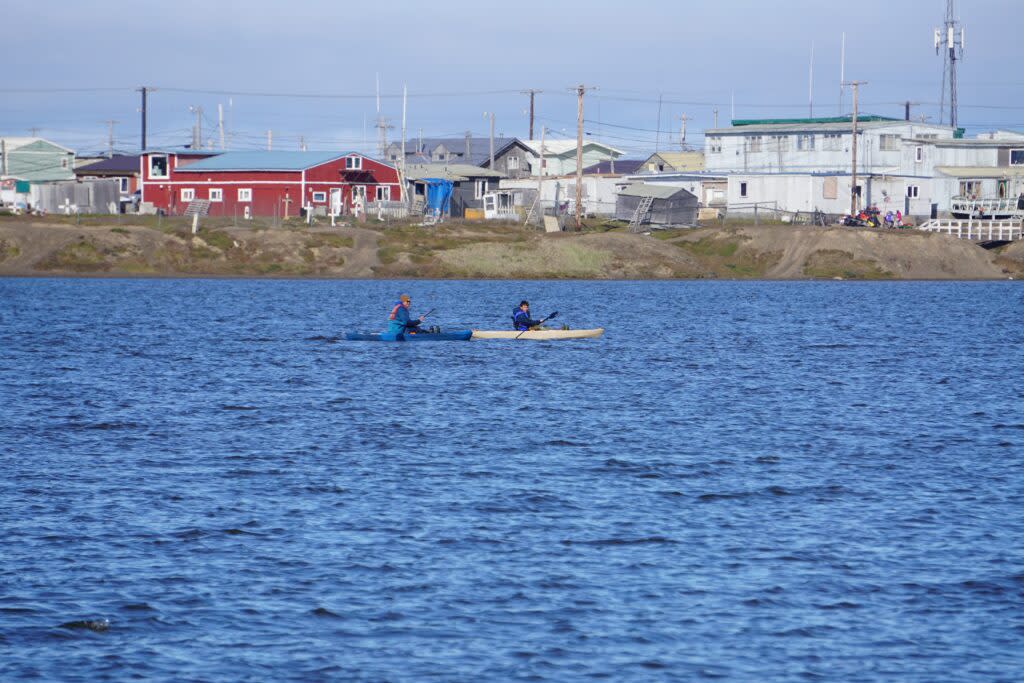Biden administration has duty to consult with North Slope Iñupiat on homelands

- Oops!Something went wrong.Please try again later.
Kayakers paddle across Isatkoak Lagoon in Utqiagvik, the nation's northernmost community, on Aug. 6. (Photo by Yereth Rosen/Alaska Beacon)
Recently, President Biden told Indigenous leaders gathered at the White House that he hopes to right the wrongs of the past, seeking to usher in a “new era grounded in dignity and respect that recognizes [Indigenous Americans’] fundamental rights to govern and grow on your own terms.” And while the Biden administration has made some strides to right historic wrongs for some Indigenous Americans, this is not a universal truth – especially in Alaska.
The reality for Alaska Native communities is that our voices have been silenced. Many of our elected leaders have been denied a spot at the table, with access granted to only those seeing eye-to-eye with the administration. Instead, Washington often looks to outside groups, purporting to speak for Alaska from their offices in New York, California and Washington. For our people and our state to thrive, we need Washington to back up its rhetoric with real action by meaningfully engaging and consulting with Alaska Native communities.
U.S. Department of Interior Secretary Deb Haaland noted the importance of Alaska Native voices in federal policymaking on a recent trip to the state. Addressing the Alaska Federation of Natives Annual Convention, she boldly proclaimed: “As secretary, it’s my job that the table always has a place for you … your voices are the ones that must be front and center.”
Yet, it’s difficult to reconcile that rhetoric with her agency’s actions. As the first Native American to hold her position, Secretary Haaland made headlines with her appointment. But her tenure has been riddled with other unprecedented firsts — namely, federal action impacting our ancestral North Slope homelands without consulting our Iñupiat tribal government, North Slope elected leaders, or our communities.
Case in point: On Sept. 6, Alaska’s North Slope Iñupiat were confounded by a surprise Interior Department announcement to withdraw millions of acres within the National Petroleum Reserve in Alaska (NPR-A) and cancel drilling leases in the Arctic National Wildlife Refuge (ANWR), without any prior consultation. Several Iñupiat villages, including Wainwright, Utqiaġvik, Atqasuk, and Nuiqsut, are the only communities within NPR-A, and another, Kaktovik, is the only community located within ANWR. Yet these communities learned of the decision like everyone else – from the media.
The Secretary and federal government further insulted our people by issuing this announcement at the beginning of our fall subsistence whaling season, when our people are working to fill ice cellars for the long winter ahead. Our communities were also without reliable internet, cellular, or landline service for months after a fiber optic line serving our region was severed in June. Service was restored on Sept. 19, roughly two weeks after the announcement.
Secretary Haaland has also ignored or declined at least eight meeting requests from the North Slope’s elected Iñupiat leadership to discuss the serious, long-term implications of federal policies affecting our lands and right to self-determination. This is not merely an issue of miscommunication or disrespect; it’s violating the rule of law. According to the 1934 Indian Reorganization Act, the Iñupiat Community of the Arctic Slope (ICAS) is a federally recognized regional Tribe. As such, it is the secretary’s duty to honor a government-to-government relationship when requested. However, this relationship has yet to materialize.
As I testified in November before the U.S. House Committee on Natural Resources’ Subcommittee on Energy and Mineral Resources: “The U.S. secretary of the Interior is obligated to honor a government-to-government relationship with federally recognized Tribes like ICAS on policies with substantial, direct effects on our land and people…Yet this legal obligation and our right to self-determination has historically been shamefully ignored by the federal government.”
Her recent visit to Alaska presented a golden opportunity to break this cycle by finally meeting with Iñupiat leaders. Yet, she failed once again to engage with the communities she is directly affecting with her department’s one-sided actions. I even flew thousands of miles to Washington, alongside a delegation of North Slope Iñupiat leaders, hoping to meet with the secretary and discuss obligations to tribal entities like ICAS. But once again, our entreaties were ignored.
We don’t yet know the impact of the administration’s decisions. Ninety-five percent of the North Slope’s tax base comes from taxation on infrastructure that supports development – not on output generated, contrary to popular assumption. The economy driven by this development sustains our culture and communities and is a remarkable example of indigenous self-determination.
When policymakers fail to consult our communities, whether intentionally or not, they prioritize the interests and opinions of those outside our state and region over those of the local residents. The secretary should welcome voices like ours, the North Slope’s federally recognized regional tribal government, rather than denying us our rightful place in policy discussions simply because our viewpoint differs from hers.
It is heartbreaking and shameful that the secretary continues to shun the North Slope Iñupiat, perpetuating cycles of inequitable policymaking from decades ago. The result is a flawed policy that dictates what Indigenous people can and can’t do on their own land — a double standard compared to any other community in this country.
The post Biden administration has duty to consult with North Slope Iñupiat on homelands appeared first on Alaska Beacon.

